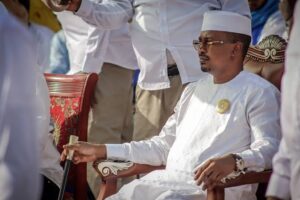In a pivotal moment for Chad’s political landscape, citizens across the nation flocked to polling stations to cast their votes in the country’s first presidential election since the passing of long-time ruler Idriss Deby. Against the backdrop of heightened anticipation and fervent campaigning, candidates delivered their final messages, vying for the opportunity to lead the nation into a new era of governance.
Among the contenders is Success Masra, the current prime minister of the interim government, who emerged as a prominent challenger in the race. Addressing supporters in the capital city of N’Djamena, Masra, a former executive of the African Development Bank, pledged to usher in a brighter future for Chad’s youth by prioritizing job creation and economic prosperity.
Central to Masra’s campaign is a bold initiative to generate 200,000 jobs over a five-year period, with equal emphasis on both the private and public sectors. Additionally, his platform advocates for urgent measures to address critical issues such as access to electricity, water, and comprehensive security measures for all citizens.
“We aspire to a nation united in peace and reconciliation, where victory transcends partisan divides to embrace the collective aspirations of all Chadians,” Masra asserted, rallying his supporters to remain vigilant throughout the electoral process.
Meanwhile, General Mahamat Idriss Deby Itno, colloquially known as “MIDI,” also made a compelling case for his candidacy as Chad’s interim president. Assumed leadership following the demise of his father, Idriss Déby, three years ago, General Deby vowed to uphold his promise of democratic transition by overseeing free and fair elections.
Also, read; Top 10 African Countries with the Largest Labor Force
Backed by a diverse coalition of political parties and civil society organizations, General Deby’s supporters tout his achievements in bolstering national security, fostering reconciliation, and spearheading constitutional reforms. Confident in his candidacy, supporters expressed unwavering allegiance to “the MIDI champion,” anticipating a resounding victory at the polls.
Despite the enthusiasm surrounding the electoral process, some opposition factions and civil society groups have called for a boycott, citing concerns over electoral integrity and governance legitimacy. Nevertheless, polling stations opened promptly on Monday morning, marking the commencement of a historic chapter in Chad’s political evolution.
As the nation eagerly awaits the outcome of the election, with results anticipated on May 21st and a potential second round slated for June 22nd, Chad stands poised to set a precedent for democratic transition amidst a backdrop of regional political upheaval. Amidst the echoes of past coups and civil unrest, Chad’s journey towards democratic consolidation serves as a beacon of hope for nations across the continent grappling with similar challenges.

